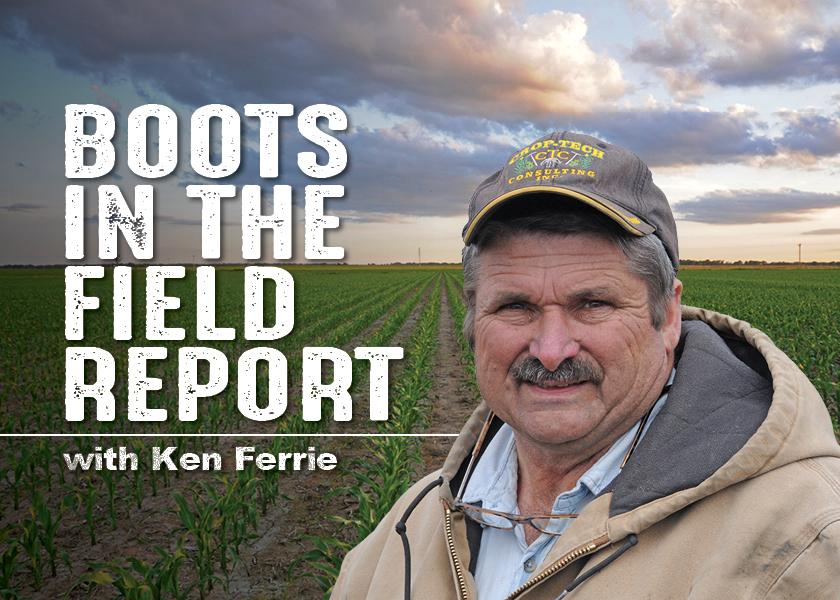Ferrie: Does Spring Or Fall Horizontal Tillage Cause More Density Layers?

In this week’s Boots in the Field Report Ken Ferrie answers three questions farmers asked during some winter meetings: Will a spring or fall horizontal tillage pass put in more of a density layer? Was it allelopathic toxins in the cereal rye ahead of corn that caused such a yield ding last season? Will there be a cap to Carbon Initiative (CI) payments per farm operation?
Ferrie, Farm Journal Field Agronomist and owner of Crop-Tech Consulting, Heyworth, Ill., answers the questions here. You can also listen to his podcast here:
1. Question: Will spring or fall horizontal tillage put in more of a soil density layer?
Answer: The first thing we need to clarify is that anytime we do horizontal tillage, we will put in a density change, because that's what the tools are designed to do. But in my book, density layers are different than compaction layers. Compaction layers are the result of doing horizontal tillage in wet conditions, especially at the depth that you're doing tillage. It doesn't make any difference if the tillage is done in the fall or the spring. If it's wet, you'll put in a compaction layer.
Horizontal tillage done in dry conditions will put in a density change, and it may turn your first and your second set of crown roots. But the third set will usually muscle its way through. Unlike compaction, that tends to stop the third set of crown roots from getting through.
How big the density change is depends on whether the horizontal pass is a standalone pass, or whether the horizontal pass is being used to finish fall tillage – let's say like a chisel plow or disk ripper – and get it ready for planting.
Horizontal tillage on top of fall tillage doesn't create near as big of a density change as a single pass run on bean stubble. Again, that’s assuming that you aren't doing it too wet.
If you have done fall tillage in dry conditions, and you can level it in the fall in dry conditions, it would be less of a problem than leveling it in the spring, if it's too wet.
In the spring, you have the calendar and the neighbors pushing you to keep you on target planting wise, pushing your schedule. And these can lead to bad decisions when you're worried about the neighbors and the calendar and you're running your horizontal pass in wet conditions in the spring.
So, if you do fall tillage, try to keep it level as possible behind the machine. Your goal is to have less than a 3" peak and valley in the spring after freezing and thawing. If you can't get that accomplished, I'd recommend leveling in the fall. Or, if you feel you're always running too wet in the spring, and the fall is drier, then level in the fall.
2. Question: Was it the allelopathic effect of cereal rye that caused so much trouble last year?
Answer: Well, the answer's maybe. A rye problem, though, is kind of threefold.
The first issue is water. Cover crops can be used to pull excess water out of the soil so we can get it ready to plant, especially in wet years.
But when the water is in tight supply, if the covers grow too long, and pull the water out of the soil leaving your cash crop short, it can be a problem.
A rye cover must be decomposed after it's terminated. And the bigger it gets, the bigger the carbon penalty, which can affect corn and soybeans.
In addition, rye can have an allelopathic effect on corn, meaning it can emit a toxinand cause stunting of the root system.
Now this toxin is water soluble, and it'll be flushed when it rains. But in dry years like 2023, the toxin continued to build without any flushing. And it not only stopped corn growth, but it set the corn behind in maturity.
Soybeans aren't bothered by this toxin, but they are affected by the carbon penalty and, of course, dry soil if it gets too dry from the covers.
We can manage some of the carbon penalty with fertility on the planter. But we can't manage dry weather and the allopathic issues without irrigation or some way to come up with timely rains.
3. Question: Will there be a payment limit by operation on the Soil Carbon Initiative scoring – like there is for the Conservation Stewardship Program?
Answer: To my understanding, no, there will not be a payment limit.
This payment will not be coming from the government to the grower. It'll be going to the biofuel producer and then from the biofuel producer to the grower, meaning it shouldn't involve any of the government offices, which should be a blessing for them. I think they have enough on their plate.
314 Bu. Corn Yield Uses Only 7" of Rain to Score Big Win in Minnesota
Damned By Data: State Destroys Farmer’s Yield, Pays $810,000 Damages







